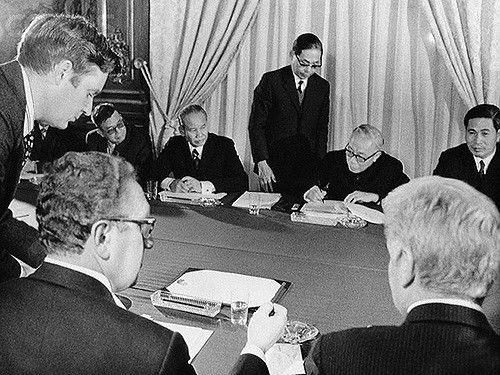
Henry Kissinger, born in 1923 in Germany, is a prominent American diplomat, political scientist, and former United States Secretary of State. As a key figure in shaping American foreign policy during the Cold War era, Kissinger played a critical role in the détente with the Soviet Union, the opening of relations with China, and negotiations to end the Vietnam War. He is known for his realpolitik approach to international relations, emphasizing pragmatic and strategic decision-making in foreign policy. Kissinger’s influence extended beyond his time in government, as he continued to advise presidents and play a role in shaping global politics through his writings and speeches. However, he has also faced criticisms for his involvement in controversial policies, such as the bombing of Cambodia during the Vietnam War and his support for authoritarian regimes in Latin America. Despite these controversies, Henry Kissinger remains a polarizing figure in American politics and a key player in shaping modern diplomatic history.
Early Life and Career
Henry Kissinger was born in Germany on May 27, 1923, to a Jewish family who fled to the United States in 1938 to escape the persecution of the Nazis. He excelled in academics and graduated summa cum laude from Harvard University in 1950. Kissinger then went on to earn his MA and PhD in government from Harvard as well. He started his career as a professor at Harvard, where he taught for several years before moving into government.
Diplomatic Achievements and Legacy
Kissinger’s most notable role was as the United States Secretary of State under Presidents Richard Nixon and Gerald Ford. During his time in office, he played a key role in diplomatic relations with China and the Soviet Union, helping to open up communication and establish diplomatic ties. He was also instrumental in negotiating the end of the Vietnam War and the signing of the Paris Peace Accords in 1973. Kissinger’s realpolitik approach to foreign policy and his willingness to engage in shuttle diplomacy have left a lasting impact on American diplomacy.
Throughout his career, Kissinger faced criticism and controversy for his role in various international events, such as the secret bombing of Cambodia during the Vietnam War and his involvement in the 1973 coup in Chile. Despite these controversies, Kissinger is still considered one of the most influential diplomats of the 20th century. He was awarded the Nobel Peace Prize in 1973 for his efforts in negotiating the end of the Vietnam War, making him the first naturalized American citizen to receive the prestigious award. Kissinger’s imprint on American foreign policy remains significant, and his legacy continues to be debated and analyzed by historians and political analysts.
 Top famous
Top famous
